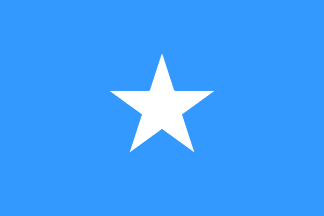UPDATE: American among those killed by U.S. attack
The NY Times is reporting that most of the Somali insurgents killed in the missile attack were Somali's living abroad. These Somali's gain asylum in the west, get indoctrinated by middle-eastern fundamentalists who speak hate freely in their host countries, and then return to their homeland to try to ensure that Somalia continues to be a country of anarchy. It is a shame. But is there any solution?
========================
MOGADISHU, Somalia - Somali officials confirmed on Sunday that an American was among the suspected Muslim radicals killed on Friday when a U.S. Navy warship fired missiles at a militant encampment in northern Somalia.
The American was not identified, but Hassan Dahir Mohamoud, the vice president of Puntland, the northern Somali region that declared itself semiautonomous in 1998, said that the American's passport had been recovered.
Five other foreigners were also killed in the strike, Mohamoud said, including citizens of Great Britain, Sweden, Morocco, Pakistan and Yemen. Two Somali nationals reportedly survived the U.S. missile strike.
"We have found an American, British, Swedish and some Middle Eastern passports on the corpses," Mohamoud said.
The presence of at least six foreigners among what officials now estimate was a group of perhaps a dozen men who arrived by boat in Puntland Wednesday night raises questions about who the men were and what their purpose was.
Their deaths in a U.S. attack highlights what apparently is an aggressive U.S. military program to help Somalia's government combat a stubborn and growing Islamist insurgency. U.S. forces twice struck suspected militants in southern Somalia in January.
The violence has increased since December, when a U.S.-backed invasion by Ethiopia toppled a fundamentalist Islamic regime that Bush administration officials said was run by al-Qaida.
On Sunday, Somalia's interim prime minister escaped an assassination attempt when a car bomb detonated outside his heavily guarded residence. News reports said five Somali soldiers and two civilians were killed.
Somali officials immediately blamed al-Qaida-linked insurgents for the attack, the second in as many weeks on the prime minister, Ali Mohammed Gedi.
"We have been patient for so long," Gedi later said on a radio broadcast. "We can no longer cohabit with these terrorists. ... We have to eliminate them."
U.S. officials have declined to confirm the U.S. role in Friday's attack on the militants' encampment outside the village of Bargal in a mountainous region 250 miles northeast of Mogadishu.
But Puntland officials on Sunday said they had coordinated closely with American forces about the group.
They said the group came ashore on Wednesday night and was apparently traveling by fishing boat to the tiny coastal nation of Eritrea, where top leaders of Somalia's former Islamist regime are believed to be hiding.
On Friday, the suspected militants came under fire from Puntland security forces, who then alerted the American military base in neighboring Djibouti. After the security forces chased the group up a brushy mountain, a U.S. Navy destroyer floating in the Red Sea fired cruise missiles at their location.
It was unclear whether the militants included any of the three al-Qaida suspects whom U.S. officials are seeking in connection with the 1998 bombings of U.S. embassies in Kenya and Tanzania, and who are believed to be hiding inside Somalia.
The clashes in Puntland were the first in the north of the country, which has largely escaped Somalia's recent violence. Somali officials pledged to continue to seek American help to root out other militants.
"The American air strike follows a series of attacks targeting any terrorist group in every hideout," said Mohammud Ali Yusuf, Puntland's finance minister. "We want any help from U.S. without harming innocent people."
"Quite a number of international terrorist groups have been looking for Somalia as an alternative base," said Somalia's foreign minister, Ismail Mohammed Hurre.
By Mahad Elmi and Shashank Bengali
McClatchy Newspapers




No comments:
Post a Comment